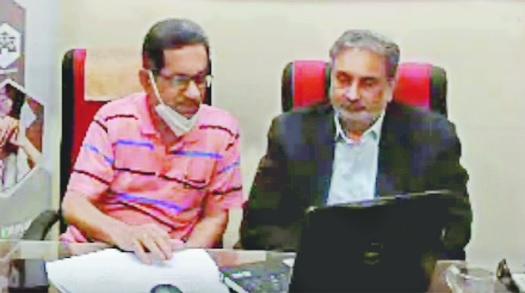‘Patent is exclusive privilege given for inven
30 Jan 2021 10:49:11

MIDC Industries Association (MIA) Hingna and GIZ India in collaboration with Rajiv Gandhi National Institute of Intellectual Property Management (RGNIIPM), Nagpur recently conducted a webinar ‘Intellectual Property Rights (IPR) and Patent Process’. Experts for the session were Pankaj Borkar, Deputy Controller of Patents and Design, RGNIIPM and Chhaya Satpute, ex-faculty, RGNIIPM Nagpur. The webinar was intended to create awareness regarding importance of patenting and patent filing process amongst MSME stakeholders and help them explore benefits that can be leveraged through IPR certification and protections.
The webinar focused mainly on - IPR - Patent procedures, what is an invention, how inventions can be protected, what is a trademark and why IPR is important for industries. C G Shegaonkar, President of MIA Hingna, initiated the event by addressing all the participants of the webinar with a welcome note. Dr Ravindra Aher from GIZ India shared the need and importance of the webinar in present business context. He also introduced participants to the speakers and shared their professional background followed by general instructions remarks.
For the first session of the webinar Chhaya Satpute introduced participants with the basic idea of Intellectual Property Rights summarizing brief history of patenting, some examples on IPR infringement, how IPR certification can provide competitive business advantages, some suggestions and advice that innovators could follow during patent filing procedure.
Pankaj Borkar initiated his presentation with introduction of six primary legal acts that supports the Indian Intellectual Property structure which consists of Patents Act 1970, Trade Mark Act 1999, Copyright Act 1957, The Geographical Indications of Goods (Registration & Protection) Act, 1999, The Designs Act, 2000, and Semi-Conductor Integrated Circuit Layout Design Act, 2000.
He further continued with explaining a patent as an exclusive privilege / right given for invention granted by Government to the patentee for 20 years from date of filing / priority for commercial gain in consideration of full disclosure of his invention as a territorial right and not worldwide. He added that, the reasons for loss of patent rights occur due to - premature disclosure, employees disputes over IPR, failure to recognise inventions and problems with joint development agreements.
The speaker highlighted the background of Intellectual Property (IP), defining what constitutes for an IP, benefits offered by IPR, what represents IP and what does not. He further explained the definitions of terms as per legal acts of ‘invention’, ‘discovery’, ‘novelty’, ’prior art’, ‘design’. He shared significance of IPR from avoiding duplication of research.
